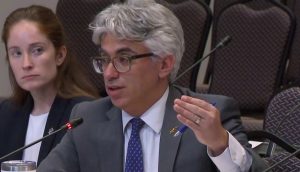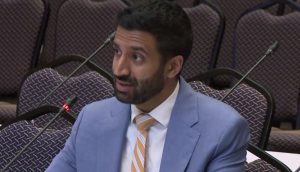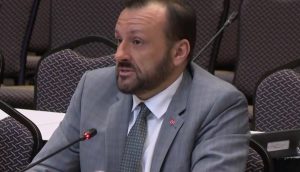CBC and Radio-Canada have been awarded the 2018 and 2020 Olympic Games Canadian broadcast rights by the International Olympic Committee (IOC).
Announced at noon on Tuesday, CBC/Radio-Canada topper Hubert Lacroix said the broadcaster will work with Rogers Media and Bell Media to execute both the PyeongChang 2018 Olympic Winter Games and the Tokyo 2020 Olympic Games.
“It was very clear in our 2020 plan that the Olympic Games are something we want to be associated with. It’s a way to connect and tell stories to Canadians from all across the country,” Lacroix said during a Tuesday press conference.
CBC/Radio-Canada was also the Canadian broadcaster for the 2014 Sochi Olympic Winter Games, for which it also partnered with Sportsnet, Sportsnet 360, TSN and TSN2.
The CBC declined to offer any specifics on the financial terms of the two-Games deal.
“We gave an offer to extend [the contract] that was respectful of the stature of the Olympics, but also fiscally responsible on our part,” said Jeffrey Orridge, executive director, sports properties and general manager, Olympics, CBC.
He also would not disclose details on how the costs were spread out between the three broadcast partners, but described the deal as an “an extraordinarily, viable business model” that would see the broadcasters break even or see positive revenue.
Through the partnership, the three broadcasters will share production resources and technical expertise along with airwave space, Orridge said, in a similar approach to how it handled Sochi Winter Olympic Games.
“This is what Canadian have come to expect. You need to have this many platforms to be able to satisfy the actual consumer demand for the Olympics,” said Kevin Crull, president, Bell Media.
The CBC will air popular “top-tier” sporting events, such as hockey games. TSN will air events that fall into the second tier, followed by Sportsnet, TSN2 and then Sportsnet 1. It will be up to the CBC to determine which events air on which networks, and it could potentially air some events across all networks to maximize exposure. The rights for the games also apply to broadcasts across mobile devices.
“What we basically are going to offer is a 24-hour Olympic network. If you have CBC, TSN and Sportsnet, you will have a 24-hour network. Instead of launching a network, we have virtually created (one),” said Phil King, president – CTV, sports, and entertainment programming.
It has not yet to been determined if NHL players will be allowed to play in the upcoming PyeongChang 2018 Olympic Winter Games, but Orridge stressed the business plan behind the deal did not depend on the NHL’s participation in the game.
“You have to look at the Olympic Games with or without the NHL players,” Pelley added. “They are different games without the NHL players participating, but that is a decision that we don’t control and we can’t influence. It’s a decision for the National Hockey League and the NHLPA.”
From Playback Daily
























